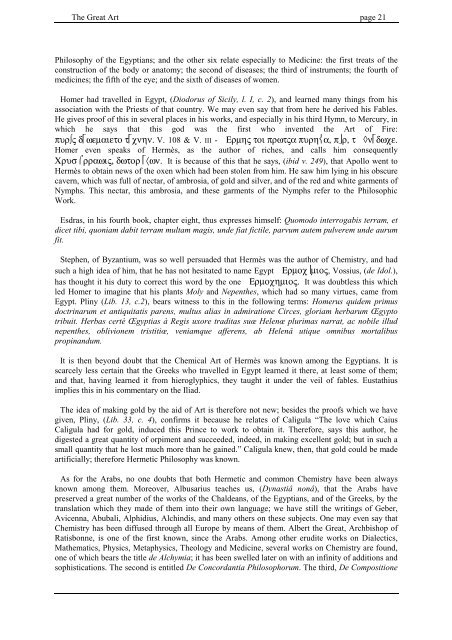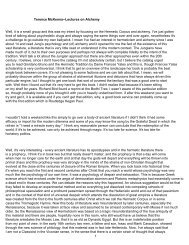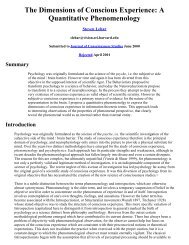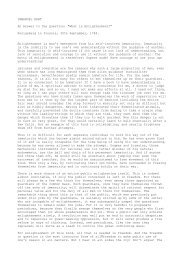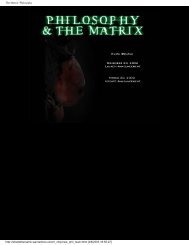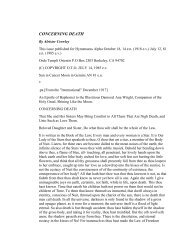Pernety - A Treatise On The Great Art.pdf - cyjack.com
Pernety - A Treatise On The Great Art.pdf - cyjack.com
Pernety - A Treatise On The Great Art.pdf - cyjack.com
You also want an ePaper? Increase the reach of your titles
YUMPU automatically turns print PDFs into web optimized ePapers that Google loves.
<strong>The</strong> <strong>Great</strong> <strong>Art</strong> page 21Philosophy of the Egyptians; and the other six relate especially to Medicine: the first treats of theconstruction of the body or anatomy; the second of diseases; the third of instruments; the fourth ofmedicines; the fifth of the eye; and the sixth of diseases of women.Homer had travelled in Egypt, (Diodorus of Sicily, l. I, c. 2), and learned many things from hisassociation with the Priests of that country. We may even say that from here he derived his Fables.He gives proof of this in several places in his works, and especially in his third Hymn, to Mercury, inwhich he says that this god was the first who invented the <strong>Art</strong> of Fire:πυρ∫ς δ⎡ωεµαιετο τ⎡χνην. V. 108 & V. III - Ερµης τοι πρωτςα πυρη⎨α, π⎦ρ, τ ◊ν⎡δωχε.Homer even speaks of Hermès, as the author of riches, and calls him consequentlyΧρυσ⌠ρραωις, δωτορ ⎡〈ων. It is because of this that he says, (ibid v. 249), that Apollo went toHermès to obtain news of the oxen which had been stolen from him. He saw him lying in his obscurecavern, which was full of nectar, of ambrosia, of gold and silver, and of the red and white garments ofNymphs. This nectar, this ambrosia, and these garments of the Nymphs refer to the PhilosophicWork.Esdras, in his fourth book, chapter eight, thus expresses himself: Quomodo interrogabis terram, etdicet tibi, quoniam dabit terram multam magis, unde fiat fictile, parvum autem pulverem unde aurumfit.Stephen, of Byzantium, was so well persuaded that Hermès was the author of Chemistry, and hadsuch a high idea of him, that he has not hesitated to name Egypt Ερµοχ⎥µιος, Vossius, (de Idol.),has thought it his duty to correct this word by the one Ερµοχηµιος. It was doubtless this whichled Homer to imagine that his plants Moly and Nepenthes, which had so many virtues, came fromEgypt. Pliny (Lib. 13, c.2), bears witness to this in the following terms: Homerus quidem primusdoctrinarum et antiquitatis parens, multus alias in admiratione Circes, gloriam herbarum Œgyptotribuit. Herbas certè Œgyptias à Regis uxore traditas suœ Helenœ plurimas narrat, ac nobile illudnepenthes, oblivionem tristitiœ, veniamque afferens, ab Helenâ utique omnibus mortalibuspropinandum.It is then beyond doubt that the Chemical <strong>Art</strong> of Hermès was known among the Egyptians. It isscarcely less certain that the Greeks who travelled in Egypt learned it there, at least some of them;and that, having learned it from hieroglyphics, they taught it under the veil of fables. Eustathiusimplies this in his <strong>com</strong>mentary on the Iliad.<strong>The</strong> idea of making gold by the aid of <strong>Art</strong> is therefore not new; besides the proofs which we havegiven, Pliny, (Lib. 33, c. 4), confirms it because he relates of Caligula “<strong>The</strong> love which CaiusCaligula had for gold, induced this Prince to work to obtain it. <strong>The</strong>refore, says this author, hedigested a great quantity of orpiment and succeeded, indeed, in making excellent gold; but in such asmall quantity that he lost much more than he gained.” Caligula knew, then, that gold could be madeartificially; therefore Hermetic Philosophy was known.As for the Arabs, no one doubts that both Hermetic and <strong>com</strong>mon Chemistry have been alwaysknown among them. Moreover, Albusarius teaches us, (Dynastiâ nonâ), that the Arabs havepreserved a great number of the works of the Chaldeans, of the Egyptians, and of the Greeks, by thetranslation which they made of them into their own language; we have still the writings of Geber,Avicenna, Abubali, Alphidius, Alchindis, and many others on these subjects. <strong>On</strong>e may even say thatChemistry has been diffused through all Europe by means of them. Albert the <strong>Great</strong>, Archbishop ofRatisbonne, is one of the first known, since the Arabs. Among other erudite works on Dialectics,Mathematics, Physics, Metaphysics, <strong>The</strong>ology and Medicine, several works on Chemistry are found,one of which bears the title de Alchymia; it has been swelled later on with an infinity of additions andsophistications. <strong>The</strong> second is entitled De Concordantia Philosophorum. <strong>The</strong> third, De Compositione


